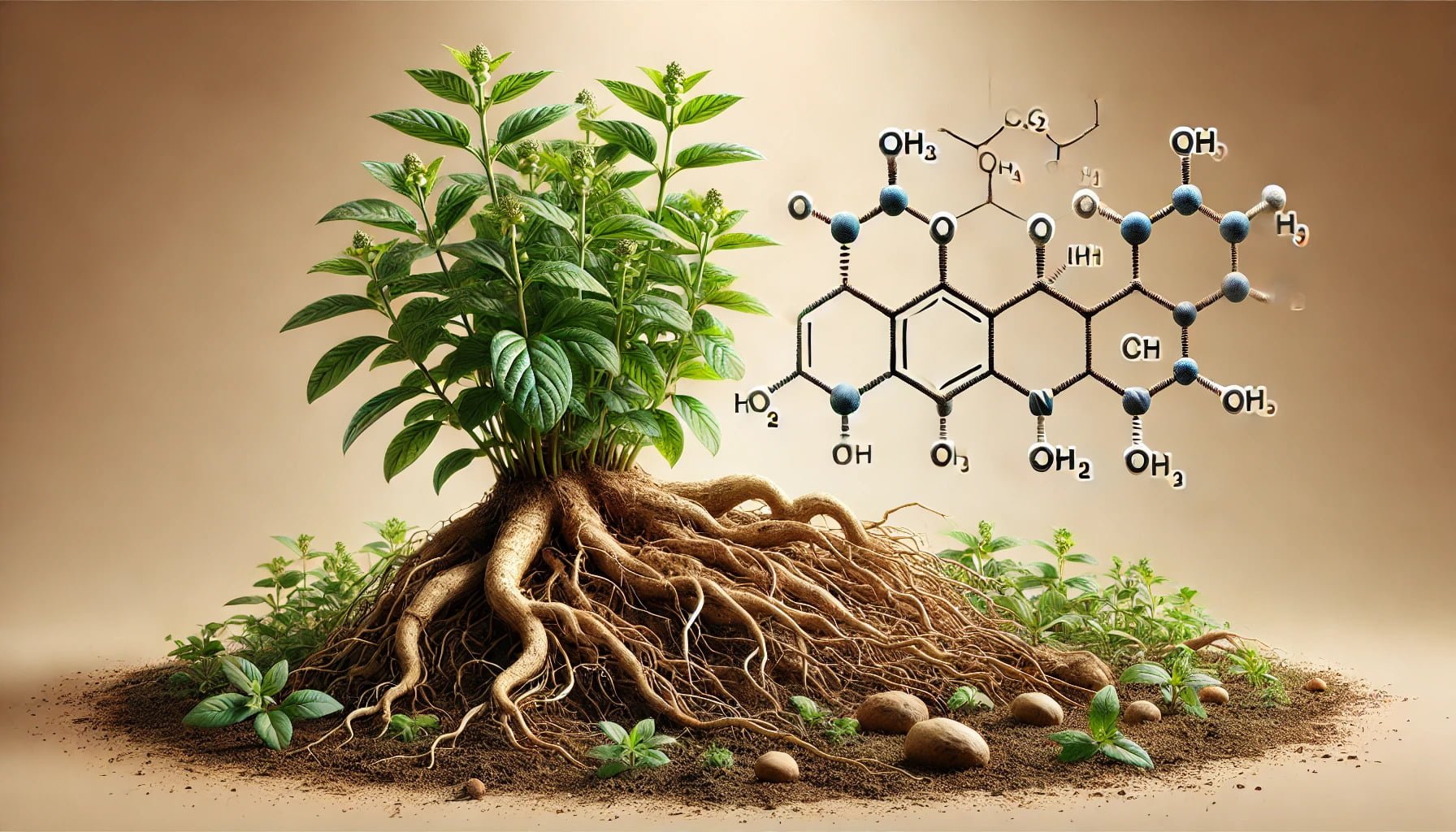
Ashwagandha (Withania somnifera), an ancient medicinal herb with potent cognitive benefits, has notoriety in the nootropics community.
This adaptogenic plant offers a wide range of potential health benefits, particularly for brain function and stress reduction.
In this comprehensive guide, we’ll look at scientific research regarding the efficiency of its numerous cognitive and overall health benefits. Learn how to incorporate this natural nootropic into your life!
Table of Contents
What Is Ashwagandha?
Ashwagandha (also known as Indian Ginseng or Indian Winter Cherry) is a powerful adaptogenic herb that has been used in Ayurvedic medicine for thousands of years.
Ashwagandha is classified as an adaptogen, meaning it helps the body adapt to stress and maintain homeostasis.

It’s a small, woody shrub native to India and North Africa, belonging to the Solanaceae family.
The plant’s roots and berries are primarily used for medicinal purposes.
Did you know?
The herb’s name, “ashwagandha“, translates to “smell of horse” in Sanskrit, referring to its unique odor and the belief that it imparts the strength and vitality of a horse.
What Are the Different Varieties of Ashwagandha?
There are several varieties of ashwagandha, each with unique characteristics. The main varieties include:
- Nagori Ashwagandha: This variety is known for its high withanolide content and is widely cultivated in India.
- Jawahar Ashwagandha: Developed by the Central Institute of Medicinal and Aromatic Plants in India, this variety is known for its high yield and disease resistance.
- Poshita Ashwagandha: This variety is rich in withanolides and is often used in commercial supplements.
- Wild Ashwagandha: Found growing naturally in various parts of India, this variety may have different chemical compositions depending on its growing conditions.
What Are The Bioactive Compounds in Ashwagandha?
Ashwagandha contains numerous bioactive compounds that contribute to its therapeutic effects. The primary active compounds include:
- Withanolides: These steroidal lactones are the most well-known and studied compounds in ashwagandha. They include withaferin A, withanolide A, and withanone, among others.
- Alkaloids: Ashwagandha contains various alkaloids, including withanine, somniferine, and ashwagandhine.
- Saponins: These compounds contribute to ashwagandha’s anti-inflammatory and immunomodulatory effects.
- Flavonoids: These antioxidant compounds help protect cells from oxidative stress.
- Iron: Ashwagandha root contains significant amounts of iron, which may contribute to its traditional use in treating anemia
What Is the Typical Withanolide Content-Range in Ashwagandha Supplements?
Here’s a breakdown of common withanolide content ranges:
- Low-potency supplements: 1-2.5% withanolides
- Medium-potency supplements: 2.5-5% withanolides
- High-potency supplements: 5-10% withanolides
The withanolides, particularly withaferin A, are considered the primary active compounds responsible for many of ashwagandha’s health benefits.
Pro Tip: Premium supplements offer higher concentrations, with most reaching up to 10% withanolides.
Why Does Ashwagandha Have a Bitter, Earthy Taste?
Ashwagandha has a bitter, earthy taste due to its unique chemical composition. The plant contains various compounds, including alkaloids, steroidal lactones, and saponins, which contribute to its distinctive flavor profile.
These compounds, particularly the withanolides, are responsible for many of ashwagandha’s therapeutic effects but also impart a bitter taste.
Some users find that the taste becomes more tolerable over time, while others prefer to consume ashwagandha in capsule form to avoid the strong flavor altogether.
What Are the Potential Cognitive and Brain Health Benefits of Ashwagandha?

Ashwagandha offers numerous cognitive and brain health benefits. These include:
- Stress reduction
- Improved memory and learning
- Neuroprotection
- Enhanced focus and mental stamina
- Anxiety relief
- Mood stabilization
How Can Ashwagandha Help Reduce Stress and Anxiety?
Ashwagandha can help reduce stress and anxiety through its adaptogenic properties.
It works by modulating the body’s stress response system, particularly the hypothalamic-pituitary-adrenal (HPA) axis.
A study by Dr. K. Chandrasekhar found that ashwagandha root extract significantly reduced serum cortisol levels and improved scores on stress assessment scales in chronically stressed adults.(1)
The herb also enhances GABA signaling in the brain, promoting relaxation and reducing anxiety.
How Can Ashwagandha Improve Memory and Learning?
Ashwagandha can improve memory and learning by enhancing neuroplasticity and promoting the growth of nerve cells.
Research by Dr. Dnyanraj Choudhary showed that ashwagandha supplementation improved immediate and general memory in adults with mild cognitive impairment. The herb’s antioxidant properties also protect brain cells from oxidative stress, which can impair cognitive function.(2)
Additionally, ashwagandha has been found to increase acetylcholine levels in the brain, a neurotransmitter crucial for memory and learning processes.
How Can Ashwagandha Provide Neuroprotection?
Ashwagandha provides neuroprotection through several mechanisms.
Firstly, it neutralizes free radicals that can damage brain cells and reduces neuroinflammation associated with cognitive decline.
Additionally, ashwagandha protects the brain from damage by stimulating the growth of new neurons and increasing brain-derived neurotrophic factor (BDNF), which supports neuronal health.
A study from the British Journal of Pharmacology demonstrated that withanolides from ashwagandha promoted axon and dendrite regeneration in damaged neurons, suggesting potential applications in neurodegenerative disorders.(3)
How Can Ashwagandha Improve Focus and Mental Stamina?
Ashwagandha can improve focus and mental stamina by reducing stress and cortisol levels, which can interfere with concentration. It also works to enhance mitochondrial function, improving cellular energy production.
Ashwagandha modulates neurotransmitter activity, particularly dopamine and norepinephrine. This helps users remain focused on tasks for a longer period without being prone to distraction, making ashwagandha an excellent study aid.
Lastly, ashwagandha improves sleep quality, leading to better cognitive performance during the day.
Research by Dr. Usharani Pingali found that ashwagandha supplementation improved reaction time and task performance in healthy adults, indicating enhanced focus and mental stamina.(4)
Can Ashwagandha Boost Testosterone Levels and Improve Male Sexual Function?
Yes, ashwagandha can potentially boost testosterone levels and improve male sexual function.
A study by Dr. VR. Ambiye found that ashwagandha root extract supplementation increased serum testosterone levels by 17% in infertile men. The herb also improved sperm quality and quantity.(5)
Additionally, ashwagandha’s stress-reducing properties may indirectly benefit sexual function by lowering cortisol levels.
How Can Ashwagandha Improve Sleep Quality and Insomnia?
Ashwagandha can improve sleep quality and alleviate insomnia by reducing stress and anxiety, common causes of sleep disturbances. Additionally, it enhances GABA activity and thereby promotes relaxation and sleep onset.
By regulating cortisol levels, ashwagandha assists in balancing sleep-wake cycles and improving overall sleep architecture.
A study by Dr. Deepak Langade found that ashwagandha root extract significantly improved sleep quality and sleep onset latency in patients with insomnia.(6)
Are There Any Side Effects or Precautions with Ashwagandha?
While ashwagandha is considered safe for most people, some potential side effects and precautions include:
- Gastrointestinal discomfort: Some users may experience nausea, diarrhea, or stomach upset
- Drowsiness: Ashwagandha may cause drowsiness in some individuals
- Allergic reactions: Rare cases of allergic reactions have been reported
- Thyroid function: Ashwagandha may increase thyroid hormone levels

It’s important to consult with a healthcare professional before starting any new supplement regimen.
Who Should Avoid or Use Caution with Ashwagandha Supplements?
Certain individuals should avoid or use caution with ashwagandha supplements:
- Pregnant and breastfeeding women: Due to limited safety data
- People with autoimmune disorders: Ashwagandha may stimulate the immune system
- Individuals with thyroid disorders: The herb may affect thyroid hormone levels
- Those scheduled for surgery: Ashwagandha may interfere with anesthesia and blood clotting
Are There Any Medications That May Interact with Ashwagandha?
Ashwagandha may interact with several medications:
- Sedatives: May enhance the effects of sedative drugs
- Thyroid medications: Could alter thyroid hormone levels
- Immunosuppressants: May counteract the effects of these drugs
- Blood pressure medications: Could potentially lower blood pressure further
- Blood thinners: May increase the risk of bleeding
It’s crucial to inform your healthcare provider about all supplements and medications you’re taking to avoid potential interactions.
How Is Ashwagandha Consumed as a Dietary Supplement?
Ashwagandha is available in various forms as a dietary supplement:
- Capsules or tablets: Convenient and easy to dose
- Powders: Can be mixed into smoothies or other beverages
- Liquid extracts: Quickly absorbed and easy to adjust dosage
- Teas: Traditional method of consumption
- Gummies: Flavored options for those who dislike the herb’s natural taste
Capsules and powders are the most popular forms of ashwagandha supplements among users, with 62% preferring capsules and 24% opting for powders.
Pro Tip: When choosing an ashwagandha supplement, it’s crucial to look for products that clearly state their withanolide content and provide third-party testing results to verify potency and purity.
What Are Typical Dosage Recommendations for Ashwagandha Supplements?
Typical dosage recommendations for ashwagandha supplements vary depending on the form and concentration:
| Form | Dosage |
|---|---|
| Capsules/Tablets | 300-600 mg, 1-2 times daily |
| Powders | 1-2 teaspoons (3-6 grams) daily |
| Tinctures | 2-4 mL, 1-3 times daily |
Note: It’s best to start with a lower dose and gradually increase as needed.
What Do Users of Ashwagandha Say?
Users of ashwagandha often report a range of positive experiences, with many noting improvements in stress levels, sleep quality, and overall well-being.
Here are some typical user quotes:
“I’ve been taking ashwagandha for about three months now, and I’ve noticed a significant reduction in my anxiety levels. I feel more calm and centered throughout the day.” – Sarah, 34
“Ashwagandha has been a game-changer for my sleep. I fall asleep faster and wake up feeling more refreshed.” – Mike, 42
“As a student, I’ve found that ashwagandha helps me focus better during long study sessions. It’s become an essential part of my daily routine.” – Emily, 22
“I was skeptical at first, but after consistent use, I’ve noticed improvements in my energy levels and overall mood. It’s subtle but noticeable.” – John, 55
Can Ashwagandha Be Used in A Nootropic Stack?
Yes, ashwagandha’s adaptogenic properties complement many other natural cognitive enhancers.
Common combinations include:
| Nootropic Stack | Benefits |
|---|---|
| Ashwagandha + Bacopa monnieri | Stress reduction and memory enhancement |
| Ashwagandha + L-theanine | Improved relaxation and focus |
| Ashwagandha + Rhodiola rosea | Increased energy and stress resistance |
| Ashwagandha + Lion’s Mane mushroom | Neuroprotection and cognitive enhancement |
- Chandrasekhar, K et al. “A prospective, randomized double-blind, placebo-controlled study of safety and efficacy of a high-concentration full-spectrum extract of ashwagandha root in reducing stress and anxiety in adults.” Indian journal of psychological medicine vol. 34,3 (2012): 255-62. doi:10.4103/0253-7176.106022↩
- Choudhary, Dnyanraj et al. “Efficacy and Safety of Ashwagandha (Withania somnifera (L.) Dunal) Root Extract in Improving Memory and Cognitive Functions.” Journal of dietary supplements vol. 14,6 (2017): 599-612. doi:10.1080/19390211.2017.1284970↩
- Kuboyama, Tomoharu et al. “Neuritic regeneration and synaptic reconstruction induced by withanolide A.” British journal of pharmacology vol. 144,7 (2005): 961-71. doi:10.1038/sj.bjp.0706122↩
- Pingali, Usharani et al. “Effect of standardized aqueous extract of Withania somnifera on tests of cognitive and psychomotor performance in healthy human participants.” Pharmacognosy research vol. 6,1 (2014): 12-8. doi:10.4103/0974-8490.122912↩
- Ambiye, Vijay R et al. “Clinical Evaluation of the Spermatogenic Activity of the Root Extract of Ashwagandha (Withania somnifera) in Oligospermic Males: A Pilot Study.” Evidence-based complementary and alternative medicine : eCAM vol. 2013 (2013): 571420. doi:10.1155/2013/571420↩
- Langade, Deepak et al. “Efficacy and Safety of Ashwagandha (Withania somnifera) Root Extract in Insomnia and Anxiety: A Double-blind, Randomized, Placebo-controlled Study.” Cureus vol. 11,9 e5797. 28 Sep. 2019, doi:10.7759/cureus.5797↩
